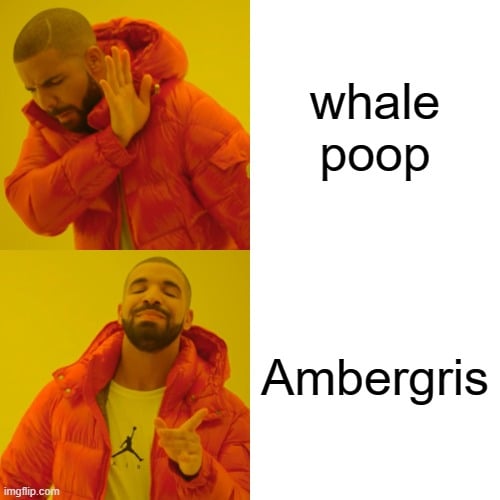Ambergris is a mass of undigested squid covered in a waxy chemical secreted by whales. This waste product develops a pleasant fragrance as it floats in the ocean.
When you think of buying perfume, you probably don’t consider whale vomit. But perfumers disagree. Ambergris (whale vomit) is actually one of the most exotic and expensive fragrances available. It is as valuable as gold and has been worth three times as much in the past!
For centuries, ambergris has been used for its aroma. Ancient Egyptians used it as incense, and the Chinese referred to it as the “dragon’s spittle fragrance”. During the Black Death in Europe, people believed that carrying ambergris would protect them from the plague. Some cultures considered it an aphrodisiac, while others used it to treat various diseases.
But what gives whale vomit such a pleasant smell? And why is it so expensive?
What Is Ambergris?
Ambergris is a waxy solid substance formed by the bile duct in the intestine of a sperm whale. Although it is called “whale vomit,” it is not technically vomit.
Like cows, sperm whales are ruminating mammals with four stomachs. They feed on squids, cuttlefish, and other sea creatures. The undigested waste, including sharp squid beaks, forms a dense mass that irritates the whale’s stomach lining. Sometimes, the whale vomits this mass into the ocean. However, this slurry is not ambergris.
 Sperm whale (Photo Credits: Catmando/Shutterstock)
Sperm whale (Photo Credits: Catmando/Shutterstock)
Some of the undigested squid beaks enter the whale’s intestinal tract. In the gut, the whale’s body produces a waxy substance that wraps around the beaks to protect the intestinal lining.
This waxy substance is a mixture of ambrein (digestive juices from the bile duct) and feces. As the mass grows, it obstructs the rectum, acting like a dam and causing feces to pile up behind it. Sometimes, the whale can excrete the ambergris, but in other cases, the mass becomes too large to be pushed out. It continues to build up until the rectum tears open, leading to the whale’s death.
In other words, ambergris is either a result of massive poop or the death of a whale due to a buildup of a large amount of feces.

How Does Whale Poop Transform into an Aromatic Rock?
When freshly defecated, ambergris is a black, waxy solid with a strong fecal odor. It is slightly less dense than seawater, so it floats on the water’s surface for years until it reaches a seashore.
Ambergris undergoes a natural aging process in the sea, transforming from fresh whale poop into a grey, fragrant substance. During this process, the ambergris is exposed to sunlight, saltwater, and tidal waves, which oxidize and erode it over the course of several years. The resulting ambergris contains acids, alkaloids, and a compound called ambrein, which gives it its unique sweet scent.
The smell of ambergris is difficult to describe, as it does not resemble any other scent. It is composed of complex chemicals, similar to jasmine oil, but with no point of reference for comparison. Additionally, the presence of other substances, such as tobacco, seawater, feces, vanilla, hay, or damp earth, can enhance the aroma of ambergris.
Fresh black ambergris has a strong fecal smell and is considered low-grade. On the other hand, aged grey-white ambergris has a rich, earthy, and salty aroma. White ambergris is the most refined, with a sweet and bright scent that acts as a fixative and enhances other notes in perfumes.
Perfumers value ambergris for its distinctive odor and fixative properties, which make fragrances last longer. Queen Elizabeth I even used to apply ambergris to her gloves for its longevity. The cosmetic and perfume industry highly values the unique and complex scent of ambergris, with its indescribable aroma being sought after for luxury perfumes.
While sperm whales are the primary source of ambergris, only a small percentage of them produce it. Thus, hunting sperm whales in search of ambergris is not practical. The international agreement known as CITES considers ambergris a “found” material, similar to waste like feces and urine. Therefore, it is legal to buy and sell ambergris only if it is found on seashores.
Next time you take a stroll on the beach, keep an eye out for a peculiar-smelling rock. You might just come across a valuable piece of ambergris worth a fortune.
